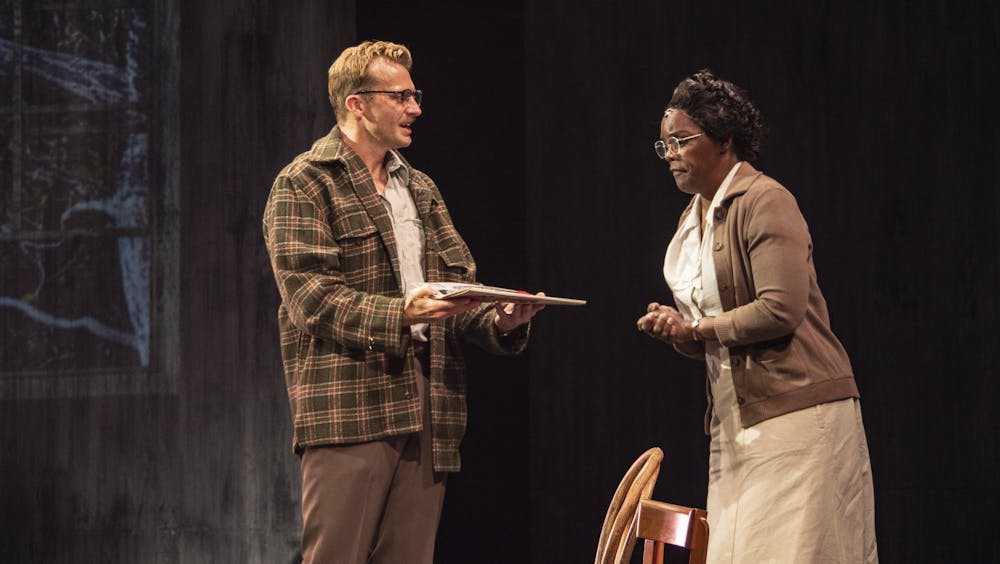Pre-Broadway premiere of ‘Miss Maude’ is changing the status quo

Playwright Martin Casella first discovered photojournalist W. Eugene Smith’s photographs of nurse-midwife Maude Callen in a museum. Incredibly moved by her story, Casella wrote the play “Miss Maude” to dramatize the meeting of Smith and Callen. Performed by the A.D. Players at the George Theater through Oct. 23, “Miss Maude” should reach Broadway by spring 2023 through the play’s projected funding, according to producer Bruce D. Long.
The play examines racial tensions between the two protagonists and their different interactions with folks in rural South Carolina. Smith (Robert Eli) is a famous photojournalist for LIFE magazine who has covered many events around the world, notably during World War II, but nevertheless comes from a middle-class, white background. On the other hand, Callen (Rosalyn Coleman) is a Black nurse midwife from rural South Carolina who transformed her community by delivering babies and nursing ill patients who could not otherwise access proper healthcare.
“I like writing stories about people who like changing the status quo and try to go out of their way to make the world a better place,” Casella said. “And that’s not always easy, but I always try to do it with humor and sensitivity.”
This overwhelming optimism pervades the entire production even during its grimmer moments. Despite their differences, Callen and Smith’s friendship — from their rapidfire banter to their caring nature — is the emotional core of the play.
“I found some letters that [Maude] had written to [Eugene],” Casella said, “Some of which [are] in the play. And she had a very clean, clear voice. One of the actors said to me the very first day of rehearsal, ‘Boy, you really don’t like adjectives or adverbs.’ And I’m like, ‘No, most people don’t use them in real life.’ And she didn’t.”
Casella conducted research for the play in rural South Carolina, where he interviewed Callen’s adopted son, Sinclair (Jeremiah Packer), and a group of older Black midwives who knew Callen.
“[The midwives] told me lots of stories and [how] Miss Maude talked,” Casella said. “[In] the play, she would always call [Eugene] ‘crazy man,’ and she does it so much that near the end of the play, he says that and the audience laughs because they’ve heard it for the last two hours.”
For Casella and Long, drawing audience laughter and tightening the dialogue was critical. To fine-tune the script, the cast and production crew modified scenes through live readings and test performances.
Coleman’s sharp delivery and range bring Callen’s intellectual wit and her fierce stubbornness to the stage, while Eli’s emotional performance draws sympathy to Smith’s alcoholism and failing relationship with his family. As a producer, Long believes the strength of this play is that neither Callen nor Smith are presented as saints.
“I think that’s part of the beauty of this particular script,” Long said. “Maude says it towards the end of the play, [which is] that these blessings and these curses all get mushed up together, and I think that’s emblematic of these people.”
Despite the hard work that the cast invested into the production, it almost didn’t happen due to an investor’s reluctance to fund a play that explored racial tensions.
“There was a fairly significant investor who thought he might want to fund the entire piece and then definitely got cold feet because of the Black Lives Matter movement, and he was afraid of cancel culture,” Long said. “Perception-wise, you’ve got a white guy financing a play about a Black woman, and he was deeply concerned by how the optics would read.”
Despite others’ reservations, the timing of the Black Lives Matter movement was what motivated Long to produce this project.
“I can remember clearly being in Charlotte and marching down the streets with a lot of other people,” Long said. “I don’t want to over-spiritualize it, but, much like Maude, I just felt like saying, ‘Now is the perfect time, we gotta do this because this is what the movement is all about: racial reconciliation, people coming together [and] working together for a common goal.’ This play really embodies the spirit of why we are marching in the streets.”
More from The Rice Thresher

Acting like an athlete: Rice basketball alum takes on Broadway
Underneath Chadd Alexander’s Broadway costume, there’s ankle tape and wrist braces — same protective gear he wore as a walk-on basketball player at Rice, though now he’s performing eight shows a week in the ensemble of “Harry Potter and the Cursed Child” instead of running conditioning drills in Tudor Fieldhouse.
“Love Island” Season 7: A Messy, Magnetic Reality Show
It was my first time watching “Love Island,” and I get it now. There's a cycle to this show: you swear you won't get sucked in, you dismiss it as background noise, and then, one week later, you're canceling plans just to hear a group of twenty-somethings debate the meaning of the word "exploring." The truth is, “Love Island” has plenty of flaws. It’s too long, too produced and too ridiculous, but I'll be the first to admit it: I'm already planning to watch next season.
Review: “F1: The Movie” puts pedal to the metal
Joseph Kosinski, Claudio Miranda and Jerry Bruckheimer — the trio behind “Top Gun: Maverick” — return to high-octane spectacle with “F1,” a sports drama that blends spectacle with surprising humanity. It’s loud, stylish and frequently overwhelming, but it’s also one of the most engaging racing movies in years.


Please note All comments are eligible for publication by The Rice Thresher.